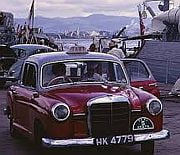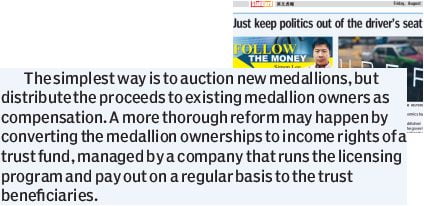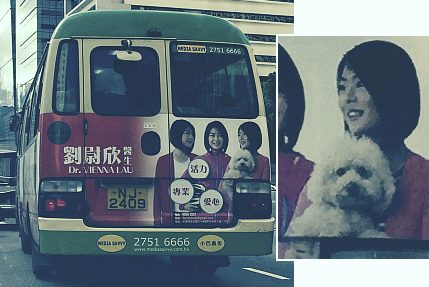Like Hong Kong’s pre-1990s British administrators, but with extra added paranoia, China’s Communist Party took care to co-opt business and other interests as a support base in its new colony. To Beijing, it seems, loyalty bought from supposed ‘elites’ is essential to control over the foreign-infested city. The alternative – winning local hearts and minds through enlightened governance – is too alien and perhaps anarchic for a one-party state to contemplate.
One result is that Beijing sees the population beyond its United Front network as hostile. This means the central government appoints senior Hong Kong officials only from the narrow and shallow pool of people it deems trustworthy. This inevitably reduces the amount of talent available; the resulting poor governance increases public hostility, which drives Beijing to rely on an even more-select group of inept loyalists – and so on in a saga of plummeting quality, the next ghastly chapter of which will be Whoever They Choose After CY Leung.
Such favouritism is also affecting the economy. We all know that the property tycoons are a caste apart, with a Beijing-granted right to skim off a fat percentage of the wealth Hong Kong people create. The luxury projects they build serve as stores of wealth for corrupt money-laundering Mainland officials. The tycoons further prosper from the influx of tourists that just so happens to wear away Hong Kong’s unique identity. Other interests, from import-export to toys to banking, get perks, protection or just flattery in return for obeisance to the Communist Party.
No doubt following the examples of the Phoenicians, Romans and Mongols, the British in 1950s-60s Hong Kong groomed dependable supporters among Shanghai industrialists. Cantonese businessmen were a bit suspect, having perhaps collaborated with the Japanese or possibly having links with the Communists. The colonial government granted these Shanghainese precious textiles quotas for selling garments to Western countries. The lucky recipients got rich without getting their hands dirty by selling the quotas on to actual manufacturers. Their descendants walk among us today – look at any flaky or slimy pro-establishment politician called Tien or Tang.
Which brings us to taxi licences and Uber. In his column yesterday, Jake van der Kamp  wrote that the Hong Kong government will never let Uber displace taxis because the holders of taxi licences form the biggest bloc in the Transport functional constituency, which in turn is part of the ‘safe patriot vote’ in the Legislative Council. In other words, the holders of taxi licences, currently valued at HK$7 million apiece, having been co-opted by the Communist Party, are immune from competition and the 21st Century.
wrote that the Hong Kong government will never let Uber displace taxis because the holders of taxi licences form the biggest bloc in the Transport functional constituency, which in turn is part of the ‘safe patriot vote’ in the Legislative Council. In other words, the holders of taxi licences, currently valued at HK$7 million apiece, having been co-opted by the Communist Party, are immune from competition and the 21st Century.
In New York City, where taxi medallion holders have not been co-opted by the Chinese Communist Party, the value of their investment peaked a couple of years ago at just over US$1 million. They have since lost 20-25% of their value, according to this, and it’s happening in other cities. (Unlike Hong Kong, US cities at least auction additional medallions occasionally.)
The Hong Kong taxi licence holder is the beneficiary of a rigged system. He has bought a bit of paper that allows him to rent a taxi out to drivers. The government keeps these pieces of paper artificially scarce, so he makes a ton of money gouging the drivers and seeing his speculative investment rise in value – while sitting back and not lifting a finger. Our landlords are in a similar position (though their investments are at least homes that someone can live in). You could call them parasites. Economists call it rent-seeking. The Communist Party calls them patriots who love the motherland.
So here’s the deal in Hong Kong today: an economic activity must be protected from change, innovators must be denied opportunities, and consumers must be denied better service/value, just so a totalitarian one-party regime can relax and think it has some friends. It’s not just taxi licences, of course. Look at the list of functional constituencies and think of all the vested interests that might beg Beijing for protection.
The Standard’s Simon Lee concocts a solution to the taxi/Uber dilemma – essentially compensating the speculators who were happy when licences rose in value but are now angry that their monopoly/free-lunch might be over…
By this reckoning, we should compensate Chow Sang Sang when declining tourist numbers force them to close gold shops. We should set up a special fund to benefit Li Ka-shing if a competition law cuts into his conglomerate’s retail profits. (If we were examining the dynamics of the relationships here, if anyone should compensate the taxi licence holders, it should be the Chinese Communist Party.)
Meanwhile, the Hong Kong government is obediently protecting the co-opted taxi licence guys at all costs, arresting Uber staff and angering citizens who want a choice. Maybe this is how it’s going to be. If you’re an outsider like Ricky Wong who wants to start a TV station, you can’t; but if you’re a property tycoon and gambling scion, who knows? Maybe when son-of-CY takes office, if you’re a patriot who loves the motherland and you want to store tons of sodium cyanide next to Taikoo Shing, you’ll be able to do that too. What price do Hong Kong innovators and consumers – the economy – have to pay to keep the CCP feeling secure?
I declare the weekend open with another delightful look (through a grimy car windscreen) at Dr Vienna Lau, the dentist promoting herself and her ‘vision, willpower and ample compassion’ at considerable expense as something-but-we’re-not-sure-what-yet, this time on a minibus. Presumably, it’s something to do with November’s District Council elections. To our horror, she’s doing dogs…



Didn’t Simon Lee once write in his column that he works 16 hours every day? Kind of makes you wonder, does he work 16 hours a day because he’s a dumbass, or is he a dumbass because he works 16-hours a day?
I, for one, would be amused to see some United Front cretin bleating into a megaphone to threaten Taxi Riots for Stability and Prosperity. And then somehow blame it all on the Yellow Umbrella kids.
I’m picturing a panel of judges giving them a 9.8/10 for mental gymnastics.
This taxi thing reminds me of something. Oh, that’s right, rickshaws in Shanghai circa 1922: http://streetsofshanghai.pbworks.com/w/page/18638696/Rickshaws
”
The rickshaw business has become one of Shanghai’s most notorious rackets, especially in the International Settlement. … At the top of the hierarchy are the official licence holders, 144 individuals or companies who register 9,900 rickshaws in the Settlement. These licence holders pay a nominal fee of $2 per month to the SMC, but the actual market value of a licence can be as high as $750. Licences are not legally transferable, so many licence holders sell on or rent their licences but remain officially registered owners and receive regular payments from the purchasers. Only about a third of licence holders actually own and manage their registered vehicles. The rest rent out or practically sell their licences. Depending on how many middlemen are involved, the net profit from such a scheme runs between 100 to 300 per cent.”
Another excellent post today, Hemmers.
Clicking on your link to the Functional Constituencies, peculiar entities to which I generally give little thought despite being a voter in one of them (I always spoil my ballot paper), I was struck by the extent to which they really do form a solid block of pro-communist votes in the Legco.
I then, however, went off on one of those hyperlink tangents and entered the labyrinthine world of Hong Kong trades unionism, and what a very queer kettle of fish it is too.
Information gleaned from wikipedia and the Hong Kong Government Registry of Trade Unions (RTU), reveals that of the three big players in local organised labour, two toe the pro-government, pro-Peking line while the other is generally pro-democracy and anti-communist. In distant fourth place, there is another outfit which, rather charmingly, supports the KMT.
So far, so good, but here the plot thickens. Take, for example, the pro-democracy organisation, the Hong Kong Confederation of Trade Unions (HKCTU), which enjoys a membership of 160,000. This, as its name suggests, acts as an umbrella for a shoal of smaller bodies, the largest of which appears to be the Professional Teachers’ Union (PTU) with some 90,000 members. The surprising thing, at least to me, however, is the size of the shoal. The HKCTU apparently comprises an astonishing 81 trade unions, which means that if one disregards the PTU, the remaining 80 unions share amongst them 70,000 members, an average of just 875 members per union.
In the red corner, the situation is equally, if not more, astounding. The big boy here is the Hong Kong Federation of Trade Unions (HKFTU) with 390,000 members shared among 187 unions, an average of 2,085 members per union. Next up is the portentously named Federation of Hong Kong and Kowloon Labour Unions (FHKLU) whose 60,000 members are shared among a staggering 85 unions. That’s an average of just over 700 members per union.
There is little information available on the pro-KMT Hong Kong and Kowloon Trades Union Congress (HKKTUC) save that it appears to enjoy a membership of 30,000 across 27 unions, a very neat average of 1,111.1111 members per union.
The upshot of all this is that Hong Kong’s four largest labour organisations enjoy a combined membership of 640,000 drawn from a total of 380 constituent unions, which translates into an average of 1,684 members per union. If one excludes the bigger constituents like the PTU, then this already small average membership shrinks further.
Which begs the question, of course, of what on earth these tiny little unions can be. Here I rely on information provided by the Registry of Trade Unions which states, for example, that in 2014 something called the Hong Kong Jingjin Practitioners General Union (don’t ask!) was registered, and that the Edible Bird’s Nest Merchants (Ching Tak) Association (last declared membership, 10) was de-registered. Thank heaven for small mercies, say I.
Alas, I have no information on the myriad unions which currently combine to form Hong Kong’s major labour organisations two of which (yes, you guessed it, the pro-communist ones) occupy the three seats in the Labour Functional Constituency, but I dare say that they’re a pretty rum bunch. Suffice to say that if the make-up of the other FC’s is even half as murky (and you can bet your boots that it certainly is in the Heung Yee Kuk FC), it provides solid evidence, if any more were needed, to support the abolition of these patently rotten boroughs.
BUT… every year the Heritage Foundation and Cato Institute somehow manage to rank Hong Kong’s economy as “the freest in the world.”
Laughable.
Not that any further evidence of the perfidy of the FCs is required, but today we have the Tourism FC, Yiu Si-Wing, Deputy Chairman of China Travel Service, never heard of him? http://www.legco.gov.hk/general/english/members/yr12-16/ysw.htm
defend the Town Planning Board approval of the plan to hand over all of TST waterfront to a property developer, despite such a strong stench of collusion that two members of this normally supine board voiced their concerns, because this would expedite the plan.
So we have a Legco member advising that due process and public consultation, and keeping Legco in the loop, must not stand in the way of ……… take your pick.
Then there is the anomaly of Greg So lamenting drop in tourist nos while at the same time govt is going to close down our main tourism attraction for 3 years and Centenary Gardens is also closed for one year.
Note that there has been no announcement re Fireworks displays on joyful reunification with motherland day, etc, Xmas lights display, Dragon Boat Carnival only recently returned to TST East and funded by Tourism Commission and a host of other annual activities. All dumped just as we move into recession. Another example of the appalling lack of both critical and lateral thinking that has plagued our economy for some years now.
Judging from the TV footage all that is required to improve the waterfront is to replace the always tacky and now abandoned cabins with something more trendy.
But of course that would not generate thousands of skip loads for landfill.
As for So’s suggestion to send the tourists to Sham Sui Po, does he mean before or after URA has consigned that district’s unique characteristics to foto albums?
The taxi drivers bemoaning Uber should study the history of minibuses in Hong Kong. These began as an illegal form of public transport, but public demand forced the government to legalise them. Sometimes not even the government can stand in the way of innovation.
Dr Vienna Lau has cloned herself, perhaps at BGI’s “warehouse” up in the Taipo Industrial Estate, which is suppose to be for factories.
Shame on you for being such an old fashioned sexist, dear blogger. He has bought a bit of paper that allows him to rent a taxi out to drivers.
Let’s be clear, Maria Tam is clearly an it, neither a he or a she, a proud member of a team of inhumans (http://iie.com.hk/councilMembers.html). To the point, Maria Tam built a commanding holding in taxi license when she was Chairman of the Transport Advisory Committee under the British, while also sitting on the board of the ICAC, thus blocking any investigations of abuse of power from this conflict of interest. Uber hasn’t a chance in hell now that CY Leung no longer needs them to shake Maria back into line.
https://newshongkong.wordpress.com/2015/08/13/why-the-hk-govt-has-suddenly-turned-hostile-against-uber/
Hehe, made a slip myself there.